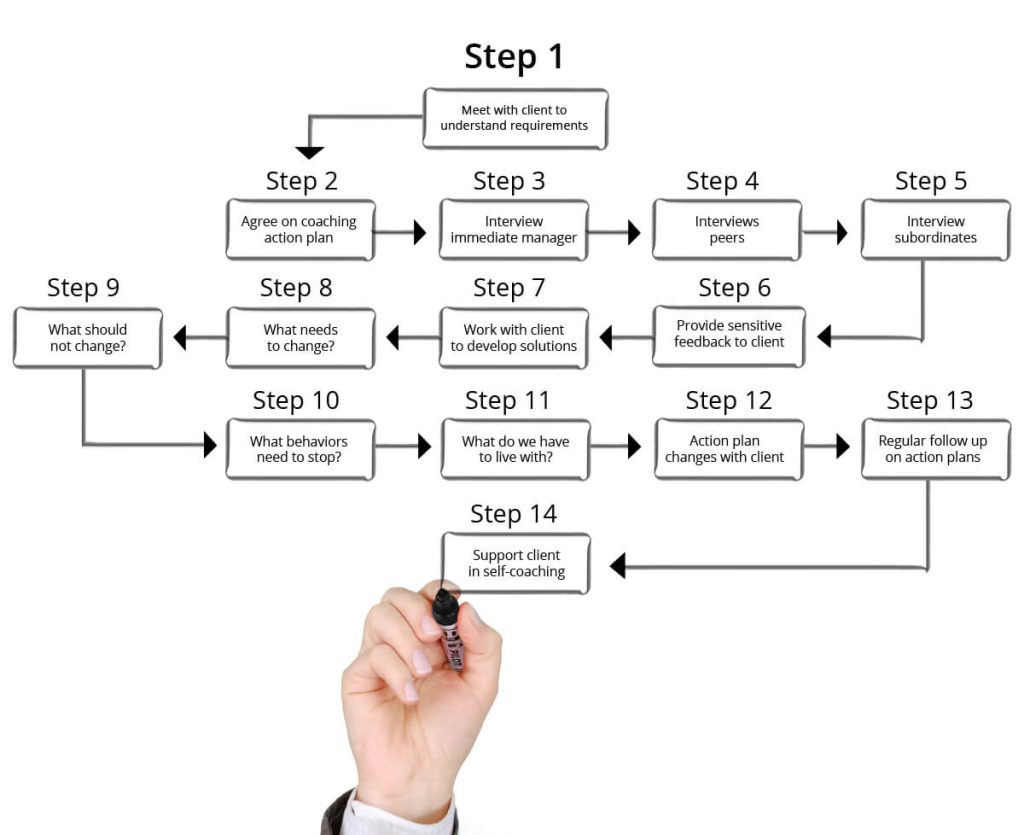Table of Contents

Athletes near the top of their game invariably make use of the services of the coach since they cannot see their errors or work out how to boost. Likewise, business executives all have self-limiting behaviors they are unacquainted with, but which impose a roof on the personal effectiveness.
Executive coaching can offer executives with responses within a protected climate, while at the same time inquiring regarding the changes they wish to make to be able to improve their effect on the organization.
Why Your Team & Business Needs a Coach?
Many business executives are taking up executive coaching because they recognize it is becoming increasingly difficult to respond to the seemingly constant change taking place in organizations today. Furthermore, they may be moving into new roles or controlling change projects in their business, and need to learn to work differently.
One of the ugly truths of executive life today is loneliness. Few business leaders have anyone to consider whom they feel can help them solve the difficulties they face in their work. Arguably, all business leaders should have access to a coach who will listen carefully and get issues on to the table in a linear, uncluttered manner to “poke with a stick” one at a time.
Subscribe to our monthly newsletter filled with good stuff
[mc4wp_form id=”20936″]
Your data are safe with us. We will never spam and you can always unsubscribe with 1 click.
Executive Coaching Philosophy
The executive coach is a sounding board; a mentor; a source of creative ideas and honest feedback. The coach’s loyalty is to the individual, in such a real way that will provide benefit to the organization. A successful romantic relationship will have huge variations from tactical conversations and strategic likely to the most seductive types of psychological explorations and individual development. Your client appears to the trainer to help heighten his / her self-awareness, to provide honest reviews, and to remain a continuous source of advice in a global world of persistent change.
A lot of the training process is approximately supporting clients to re-connect using their “personal” in a manner that brings new insights into what they need from life and exactly how they wish to relate to the business where they work. To reach your goals, therefore, the relationship between client and coach needs to be confidential and built on trust; training sessions give space for “included reflection.” As well as the qualities of a good trainer include being empathetic, non-judgmental, wondering, and imaginative, as well as having a higher degree of self-awareness and a simple wish to help.

Executive Coaching Process
Effective executive instructors use the abilities of active hearing, reflection, and building rapport. Besides, they provide reviews and make use of the therapeutic interventions for exploring covert and overt meanings, interpretation, high-quality inquiry, and the utilization of metaphor. These skills are confirmed against a deep understanding of organizations and business, and of the competencies necessary for success in prime management positions.
Benefits of Executive Coaching
Research implies that effective executive training can increase professional efficiency by up to 30%. Based on the Oxford College of Training & Mentoring, however, in choosing the personal trainer you should consider someone who:
- Has a credible background of relevant experience and understanding of your work framework.
- Provides you a feeling of self-confidence they are focused on your self-development sincerely.
- Convinces you that you can trust them with your most confidential emotions and ideas.
- Appears to talk about your values and beliefs.
- Has relevant certification as an professional coach.
- Listens than talks rather.
- Drives a trusted family saloon when compared to a showy sports activities convertible rather.
People come to training for several reasons:
- They might be “trapped” and can’t think of what else to do to have the ability to move the business enterprise forward
- There could not be anyone at their level they can have private conversations with, or they believe if indeed they were to change/improve something within themselves indeed, the higher firm would advantage.
Maybe they’ll be prepared to do something different but aren’t sure what that “something” is. Executives are searching for a change perhaps, a different perspective, or have important goals to attain. Professional or “business” training focuses on assisting individuals to go from where they may be, to where they need themselves and their company to be.
Whatever the reason, distinct from other forms of training, coaching focuses on a specific way of “learning” for the executive. It is believed that “the more an individual is involved in identifying problems, in working out and applying solutions for them and in reviewing results, the more complete and the more long-lasting the learning is. This form of self-improvement tends to bring about learning with a deeper understanding than learning that is taught.”
Given the right circumstances, one-on-one interaction with an objective third party, who is not tied to the organization or other executive or company influences, can provide a focus that other forms of organizational support cannot. Coaching develops the leader in “real time” within the context of their current job while allowing them to maintain their day-to-day responsibilities.
To help put coaching into perspective, the model on the opposite page will help to show the differences between coaching, mentoring, counseling/therapy, and consulting.
“Unlike therapy, which goes into depth about various issues usually dealing with the past and consulting which generally leads to giving your client answers, coaching is more action-oriented and focuses on the present and future primarily.” Coaching targets what your client desires and utilizes an activity through the one-on-one training sessions to permit your customer to self-discovery, learn and determine their own “answers.” It is the customer who determines the goals and commits using their goal while allowing the trainer to keep them accountable.
Subscribe to our monthly newsletter filled with good stuff
[mc4wp_form id=”20936″]
Your data are safe with us. We will never spam and you can always unsubscribe with 1 click.
Why should you hire an Executive Coach?
In today’s demanding business environment (cost pressures resulting in flatter organizations, professional managers with an increase of direct reviews, “speed to advertise” as a competitive advantage as time passes pressure) executives have limited chance to devote energy and time to their development as leaders. “Most executives battle to fulfill the obligations of their positions and are too occupied and too pressured to step back again and study from their encounters or to put into action changes to fulfill best management methods.”
The reason why for choosing training to exceed the necessity to correct or resolve problem behaviors or poor performance issues. Professional training is preferred to build up executive-level skills also, developmental and development needs which impact the whole organization.
Inside scholarly research by Diane E. Lewis, respondents determined the number of known reasons for employing executive coaches. The reasons cited below encompass both problems solving and developmental emphases. They may be referred to as change-oriented also, with a focus on refocusing and supplementing the participant’s skills, or growth-oriented, with a focus on accelerating the training curve for high-potential or lately promoted professionals. The percentage of respondents citing that one reason is within parenthesis:
- To develop the leadership skills of high-potential individuals (86%).
- To enhance the odds that recently promoted managers would achieve success (64%).
- To develop management and leadership skills amongst their technical people (59%).
- To right behavioral problems at the management level (70%).
- To help leaders take care of social conflicts among employees (59%).
The Process
Each training engagement starts with a “discovery” program of some kind. It is now time where in fact the potential customer and trainer have a discussion to determine and discuss several goods that can include:
- What your client wants in the training relationship
- What the training romantic relationship is and isn’t
- The design of the coach and exactly how that resonates with the client
- Guidelines of engagement and protocol (Training is confidential and priority to your client, nobody else!)
- The coach’s credentials in accordance with the client’s needs
- Timing and logistics of the training
- How success for training will be measured
- Agreement to go forward

Examples of Coaching Options
In a majority of cases, the coaching sessions happen weekly (3 to 4 times per month). Since the client expects to make changes and improvements for themselves, weekly sessions help keep the process on track and also serve as an “accountability” measure to the incremental improvement, along with addressing some other situations the client wishes to discuss with the coach.
Subscribe to our monthly newsletter filled with good stuff
[mc4wp_form id=”20936″]
Your data are safe with us. We will never spam and you can always unsubscribe with 1 click.
Personal Development Coaching (8 – 15 hours)
Normally, this is for 90 days or less. The focus of the ongoing work is to recognize and prioritize personal development needs. This ongoing work is usually done with the executive and the executive’s supervisor or HR. Interviews are conducted, and a development plan is established with your client.
This coaching jump-starts the program with an instant transition to client independence with the supervisor and HR support for continued progress. This training is defined more like a three-way relationship between your executive, the trainer, and the continuing business, where all included acknowledge specific goals and variables. Issues discussed in an exercise program, however, beyond the established variables, are believed “personal and confidential.”
Executive Coaching (30 – 60 hours)
This training is perfect for at the least half a year up to one. The focus is to recognize and prioritize developmental goals and problems with an action plan. The trainer shall collect data with a customer questionnaire, a 360-level responses process, and other diagnostic assessments such as Myers-Briggs, Power Finders. The trainer is accountable for dealing with the professional to look for the plan, its implementation, and the following follow-up. The trainer also lends support to your client in concentrating and dealing with on the tactical issues of the business, while addressing personal developmental issues simultaneously.
Team Coaching (30 – 60 hours)
Many times, an executive team will have an off-site conference where the company’s strategic plan is discussed, vision & values are established, and team goals are determined. As a result of this different team process, individuals make a “commitment” to change to help the organization move forward or to the next level.
In other words, if a change is to happen, everyone has to commit to doing something different than he or she have done previously. Individual executive coaching then follows the off-site getting together with for six to twelve months to ensure the team objectives are being met and remain in focus. The above description of Executive Coaching would apply. Quarterly “check-ins” with the team are held to validate progress and ensure main priorities are still correct.
What makes a difference to coaching outcomes?
Everyone involved in the coaching process wants to know which factors shall enhance the likelihood of attaining positive outcomes. Many attributes produce a notable difference in training outcomes, a few of that are listed below.
Organizations must maintain the favor of and consent to provide resources to aid the executive training and know that it needs a long-term investment for the preparation and change to achieve success. “Executives need follow-on reinforcement and training to be able to sustain changes in behavior. Also, specialists’ development should be held split from performance because the advanced of trust and openness necessary for development would be compromised if both of these essential procedures are blended.”
The coaching-style preference is one factor for coaching success also. The trainer and the professional are agreeing to enter a “romantic relationship” therefore style choices, and compatibility can impact the outcomes. It is vital that the coach and the client decide on how the client prefers to receive help, what they want to focus or work on, and when they want to receive it.
Coachability, in my opinion, is the number-one success factor to consider. The reason is that no matter how experienced or effective the coach might be, no change of the executive (coachee) will happen if the executive does not want to change, recognize the need to change, or does not take responsibility for the change needed. The executive needs to be open to feedback, prepared to use the opinions to commit to change, and be prepared to be held accountable for the commitment.
Competence of the coach is the fourth important factor that is often mentioned to determine success in the coaching arrangement. At minimum coaches should be credible, educated and certified. They should have a coaching process that includes helping the client arranged an action plan to change behavior as well as a method to measure change.
The International Coaches Federation estimates that over 10,000 people call themselves coaches, yet not all are effective. The coach should have a school of thought of training for sustainable change; quite simply, the coaching commitment should “transactional” be “transformational” rather than.
Subscribe to our monthly newsletter filled with good stuff
[mc4wp_form id=”20936″]
Your data are safe with us. We will never spam and you can always unsubscribe with 1 click.
Ready To Boost Your Business & Team’s Results?
Most organizations think that someone reaches an executive or senior status in the organization once, they need to have the ability to take action under great pressure inherently, inspire and implement ideas, keep their skills clear and current, and also have all the answers. In actuality, they can eventually get there on their own, but the engagement of a qualified executive trainer will exponentially increase not only enough time it requires for the professional to make it happen but also the power for the professional and the business to keep up the change.
Improvements that stem from coaching engagements include improved executive learning directly, raises corporate performance, improved human relationships, increased leadership performance and organizational and personal improvements. Along the way, not only do executives improve themselves but have a more significant effect on their corporation.
Benefits to the business include enhanced person and organizational performance which positively affect corporate culture. These provide improved reputation within the industry further, improved employee morale, and favorable work conditions, higher productivity and enhanced client relationships thus. Coaching will probably be your competitive edge!

See How My Agency Can Drive Massive Amounts of Traffic to Your Website
SEO – unlock massive amounts of SEO traffic. See real results.
Content Marketing – our team creates epic content that will get shared, get links, and attract traffic.
Paid Media – effective paid strategies with clear ROI.